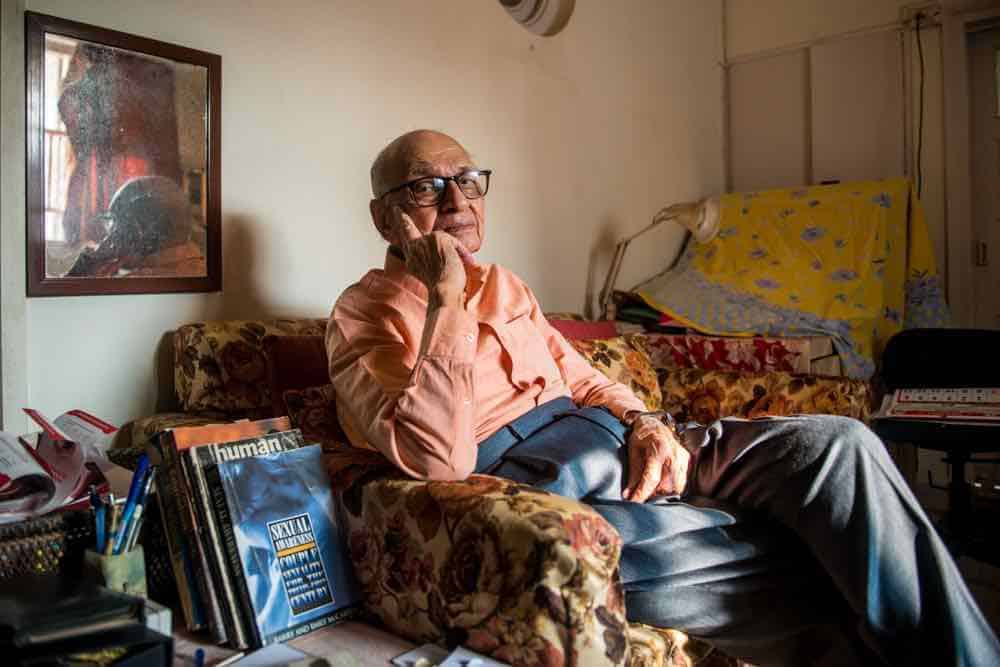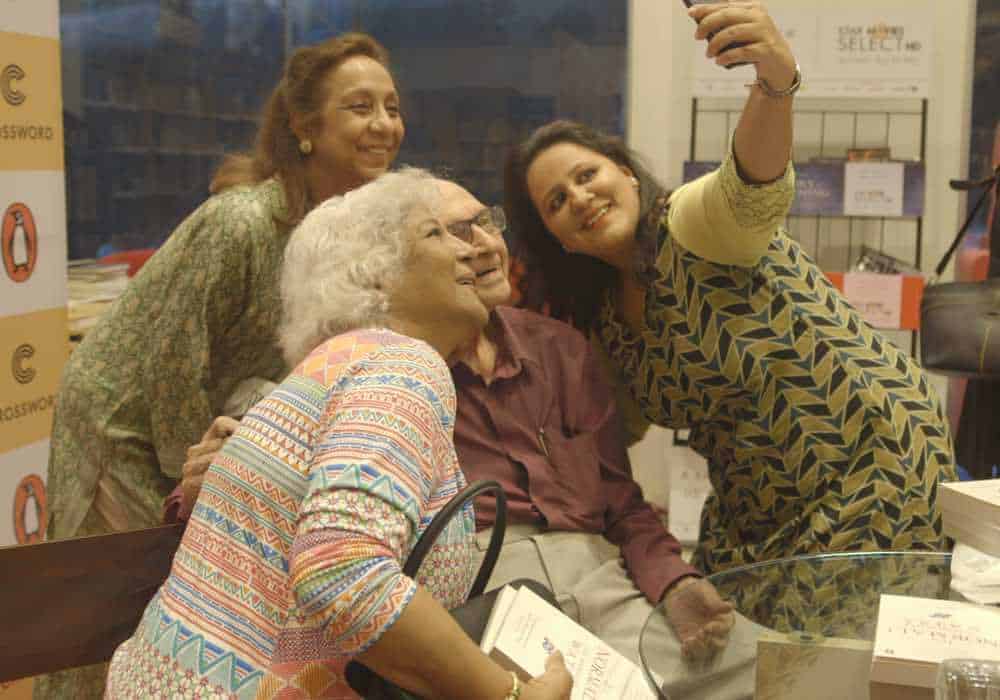Ask the Sexpert follows Indian sex expert Dr. Watsa as he navigates the debate about sex education, his patients, and his fans, in this doc from Vaishali Sinha.

Vaishali Sinha’s documentary, Ask the Sexpert, is a film about Physician Dr. Mahinder Watsa, the approachable 90-year-old celebrity who writes an extremely popular sex advice column in Mumbai, India. Watsa is a light-hearted character. To promote sexual education, he regularly travels the world to give interviews and talks at conferences. His matter-of-fact answers about sex often causes his audiences to burst into laughter The film brings us into his home to see the personal side of a public figure who tries to help people all over India have safe — and better —sex.
Director Vaishali Sinha and I talked about the importance of making a film about sex education and the debate in India surrounding whether it’s appropriate.
The Seventh Row (7R): What brought you to Dr. Watsa and his column?
Vaishali Sinha (VS): I conceived of this story in the fall of 2012. I had made a couple of really intense films. I really wanted to make a film that would be going back to the basics. I started thinking about a film about sex education, [about] a sex therapist and his [or her] clients. I wanted to keep it light-hearted with the possibility of humour.
I wanted to base this in Mumbai where I grew up. In India, conversations are slowly opening up around [sex], but by and large, people are very conservative around talking about their feelings, let alone fantasies and desires, openly.
[clickToTweet tweet=”‘In India, conversations are slowly opening up around sex, but by and large, people are very conservative.'” quote=”In India, conversations are slowly opening up around sex, but by and large, people are very conservative.”]
So where does one go to talk about these questions? Where can one divulge their truest, most raw feelings? I figured a therapist is where one would want to be most honest. That was the beginning of my search.
I came across Dr. Watsa’s column in my research and realized how widely popular he was. He had to be the story. His world would be a lens into this larger sociological [issue] that I was trying to capture. I’m very interested in character- driven stories. The character comes before the story. I was very happy to know the person behind the column. I wanted to understand him first and then also the work.
HotDocs Interview: Director Ali Weinstein dives into a community of Mermaids
7R: Did you approach him to make the documentary?
VS: I emailed him, and I called him. I found him quite easily. He puts his phone number and email in the newspaper column, as well as on his website. I sent him an email giving him my bio and what it is that I was researching. He was quite open to meeting me. This was in [March] 2013. Not much had been written about him in the newspapers at this point.
We talked on the phone. We set up a time to meet. On the phone, I couldn’t tell [his age]. I went to his place, he opened the door, and my jaw almost dropped, because I did not think he would be that old. In 2013, he was 89, so that was a pleasant surprise. We had a chat. He is very open. His theory [about sex education] was, “Let’s invite many people to have a discussion. The only way to keep moving forward is to encourage people, and young people, to talk about sex education.”
[clickToTweet tweet=”‘The only way to keep moving forward is to encourage people to talk about sex education.'” quote=”‘The only way to keep moving forward is to encourage people to talk about sex education.'”]

7R: Has Dr. Watsa gotten any pushback from the conservative Indian community about his work?
VS: In the film, one of our [stories] is about [how] the column that he writes for has been charged with a case of indecency. This is actually a criminal case. There is an investigation [by the police, and] then there is a criminal case. It’s actually pending and ongoing. If convicted, he could be in prison. But would that happen in his lifetime? We don’t know. [These] harassment cases are holding back people from doing good work.
He does receive hate mail often. His [contact] information is readily available. People will just give him a piece of their mind, which is another setback of being a public figure. It’s interesting how he keeps his guard down and keeps his address and phone number quite accessible. The need to do the things he does outweighs the threats he receives.
[clickToTweet tweet=”‘The need to do the things he does outweighs the threats he receives.'” quote=”The need to do the things he does outweighs the threats he receives.”]
HotDocs Interview: Stacey Tenenbaum on elevating the shoe shining profession in Shiners
7R: You show both sides of the sex education argument in India, for and against.
VS: First and foremost, my goal with this film was to put conversations about sex positivity at the forefront. I wanted to stay in a fun space.
[clickToTweet tweet=”‘My goal with this film was to put conversations about sex positivity at the forefront.'” quote=”My goal with this film was to put conversations about sex positivity at the forefront.”]
There are conversations that Dr. Watsa is having with people that even took me aback. We have [assumptions] that this is simple stuff, and we know how to handle things. It was fun being able to observe someone first-hand [learning about sex].
HotDocs Interview: Director Ali Weinstein dives into a community of Mermaids
7R: How does Dr Watsa handle issues of consent and sexual violence?
VS: I made a very conscious decision to talk about pleasure, desire, fantasy, and sex positivity outside of the discussion of violence. You won’t see Dr Watsa talking about rape or sexual violence.
[clickToTweet tweet=”‘I made a conscious decision to talk about pleasure, desire, and fantasy outside of violence.'” quote=”I made a very conscious decision to talk about pleasure, desire, fantasy, and sex positivity outside of the discussion of violence.”]
It’s very interesting in the way he responds to that. There was a question by a guy [who asked him] about crossing the boundary between fantasy and a crime. Dr Watsa gets those [questions], and he says, “It’s okay to have fantasies, and it’s okay to have your private desires. But it’s another thing to act on them.” The many questions that he gets do speak to the concept of consent. I think he deals with that quite often in his column. Step one to so many problems we are having today is [consent].
Read the rest of our HotDocs coverage here.
HotDocs Interview: Director Kalina Bertin explores her family’s bipolar disorder in Manic

